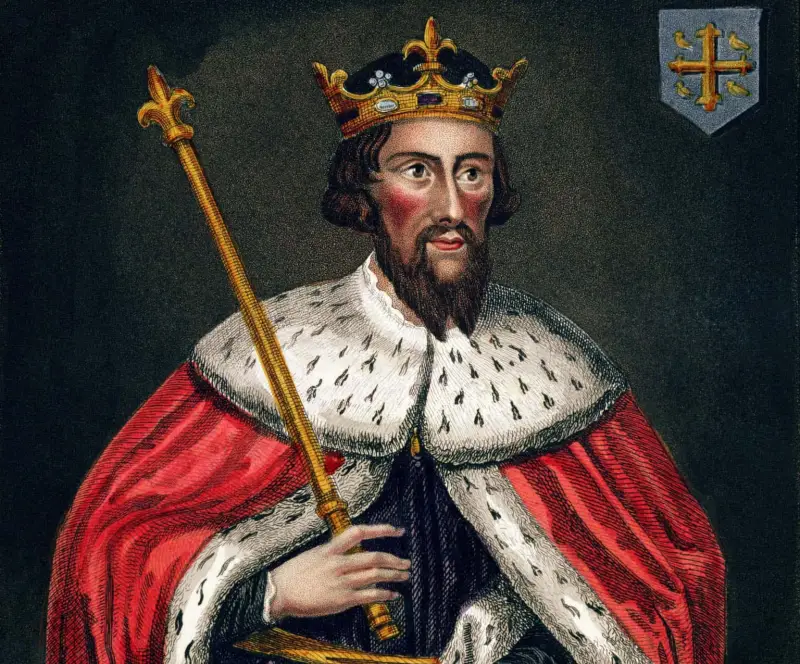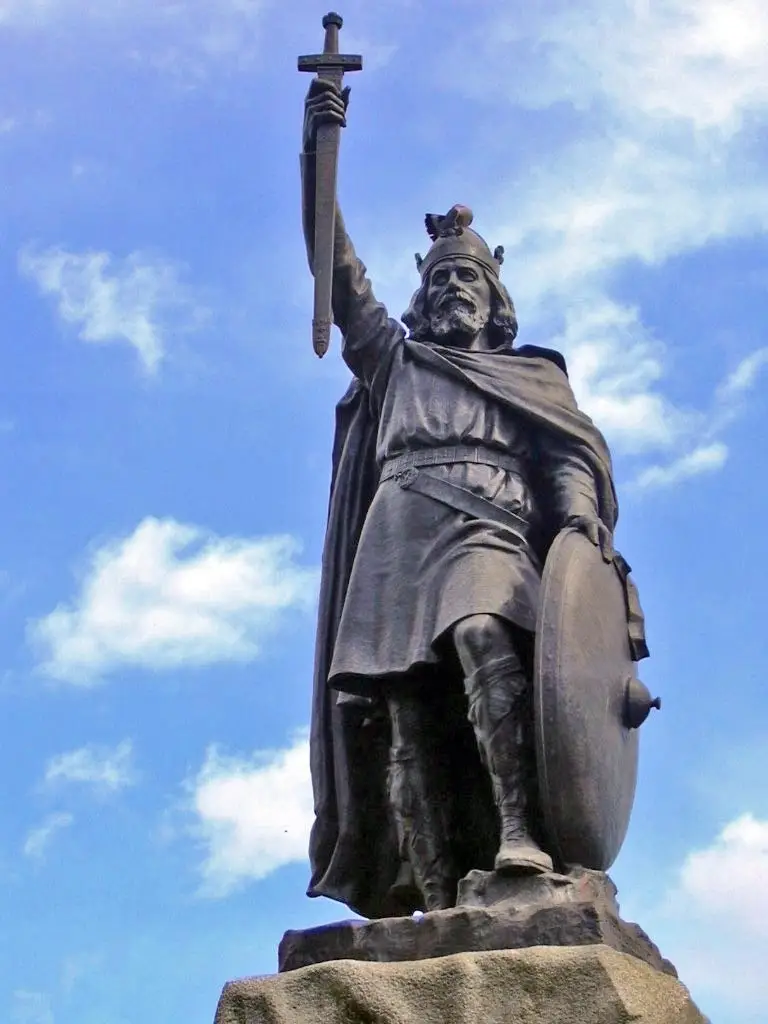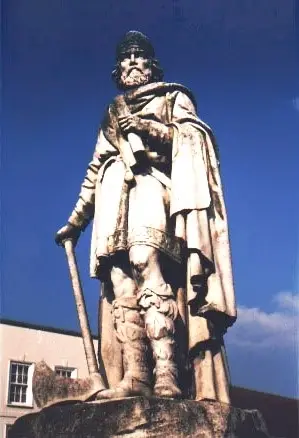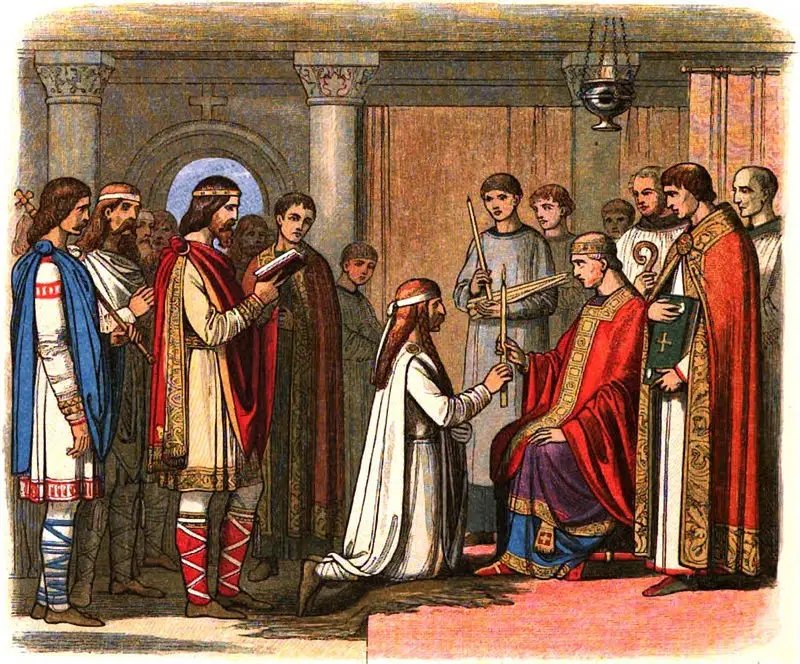Alfred the Great: the beginning of the reign of the “gatherer” of English lands

Alfred the Great became famous after his military victories over the Vikings and later successful negotiations with them. Alfred's biographer Asser (died c. 909) described his reign in detail, thanks to which it became known to posterity.
Alfred's military and administrative skills brought stability to Britain after almost a century of Viking raids. Also, under his leadership, classical works were translated from Latin into English, public schools appeared, the armed forces were reformed, and the country's legislation was improved. Later historians considered him the most outstanding English king of the Middle Ages.
And such an assessment is hardly an exaggeration. To more clearly imagine its meaning in British stories, mentally imagine a ruler who absorbed the features of Peter I and Ivan III, who came to power at the height of the Mongol-Tatar invasion, defeated the Mongol-Tatars in a long and stubborn struggle, forced Batu Khan to accept Christianity, after which he united the fragmented country, built fleet and carried out numerous reforms.
Early life and rise to power
Alfred was born around 849 to King Aethelwulf and his wife Osburga. When he was about four years old, his father went with him to Rome on a pilgrimage, where he met with the Pope and, according to the Anglo-Saxon Chronicle, Alfred was anointed king. And this despite the fact that Alfred was the youngest son of his father, and his older brothers - Ethelbald, Ethelbert and Ethelred - were ahead of him in line to the throne. Thus, Alfred initially had little chance of coming to power.

Alfred the Great statue in Winchester
Alfred's mother, Osburga, had a great influence on her son. She is described in Asser's book The Life of King Alfred as an intelligent woman who had a significant influence on his lifelong interest in learning; this characteristic shaped many of Alfred's subsequent achievements.
The role of his mother in his life, as well as fatherhood, are the most significant changes in Alfred's biography in the Vikings series. In the series, his mother is Judith, princess of Northumbria, who is married to Æthelwulf but becomes pregnant by the Christian monk Æthelstan. Although Judith's character is portrayed as caring for her son, the filmmakers made no mention of Alfred's mother's influence on his education. His brothers and their achievements are united in the persona of Aethelred, and the personality of his father Aethelwulf is also significantly changed.

The image of Alfred (actor Ferdia Walsh-Peelo) in the TV series “Vikings”
Alfred's older brothers were not in power for long, dying at a young age. In 865, Alfred was declared heir to his brother Æthelred, and after his death six years later received the crown.
Obviously, at that time, few would have thought that Alfred would stay in power for a long time and become a more outstanding ruler than his brothers. He was often ill, looked frail, spent a lot of time reading books and had little interest in military affairs. Meanwhile, he had to continue the wars with the Vikings, who by that time had already overthrown several Anglo-Saxon kings and conquered their states.

Wars against the Vikings
In the first battle of Reading, in which Alfred had a chance to take part in early 871, the Wessex troops were defeated. Asser writes:
The Battle of Ashdown in January 871 showed Alfred's ability to act in a difficult situation. The first victory was won in this battle.
Although Æthelred was the formal commander-in-chief under Ashdown, the chronicles attribute credit for the victory to Alfred. Thus, it is stated that when Alfred arrived on the battlefield, he saw his brother praying. Despite persuasion, he refused to launch an attack until he finished praying. Then Alfred, without hesitation, himself led the troops into the attack.
In April of the same year, Ethelred died from wounds received in battle. At the next battle at Wilton, Alfred was initially successful: the Viking ranks were broken and they fled from the battlefield. However, Alfred's strength was also already exhausted. Regrouping, the Vikings defeated the British.
After this, since both sides suffered heavy losses in continuous fighting, a truce was concluded. Alfred paid the Viking leader Halfdan a ransom to force his army to leave Wessex.

Alfred the Great statue in Wantage
Several peaceful years were not in vain for Alfred. He significantly replenished the ranks of his army, strengthened the fortresses, but most importantly, he began construction fleet. The Anglo-Saxons had a small number of ships before, but it was under Alfred that the fleet became a formidable force. Previously, the Vikings had complete dominance at sea, thanks to which they could land anywhere and, even after defeats on land, retreated on ships and then returned again. One can only be surprised that before Alfred, none of the Anglo-Saxon kings attached much importance to the fleet.
The construction of ships was just the beginning. Experienced sailors were also needed who could repel the enemy in a naval battle. Since there were no such in Wessex at that time, Alfred hired Frisian pirates into his service. Such steps soon yielded the first results: already in 875, Alfred's fleet won its first victory over the Vikings in a naval battle.
In the spring of the following year, active hostilities resumed on land, the Vikings captured the city of Exeter. Alfred's fleet defeated the Viking ships and then blockaded Exeter. From land, the blockade was supported by the army. Realizing that there would be no help, the Viking detachment capitulated. According to the agreement, Alfred agreed to release them in exchange for a ransom, the surrender of hostages and an oath that they would no longer attack his possessions.
However, this oath was broken as soon as the Danes learned that Alfred had sent most of his army home. At Christmas 877, a large Viking army under King Guthrum invaded Wessex. Not expecting an attack and carried away by the celebration, the British were taken by surprise. The Vikings immediately took Alfred's residence, the city of Chippenham, and carried out a brutal massacre there. Alfred himself, with his family and a small number of warriors, was able to escape and hid in the forests for several months. Asser describes this period as follows:
After this, the Vikings took and ravaged London, then the cities and villages of Southern Wessex were plundered.
It seemed that the last kingdom in Britain unconquered by the Vikings was completely broken, and it would no longer recover from defeat. But Alfred didn't give up. He sent messengers to all corners of the country and began to assemble a new army. The warriors flocked to him individually and in small groups. Before the decisive battle, the king disguised himself as a traveling musician and personally visited the Viking camp, finding out all the information he needed.
In early May 878, Alfred's troops attacked the camp of the Viking king Guthrum. After a long and stubborn battle, the Vikings fled to Eddington Fortress. Alfred completely surrounded her, and two weeks later Guthrum, who was beginning to run out of supplies, requested peace negotiations.

Guthrum's baptism. Miniature by J. Doyle from A Chronicle of England: BC 55 – AD 1485 (1864)
Alfred's conditions were quite mild: the Vikings had to leave Wessex, and Guthrum and 30 of his closest associates had to convert to Christianity. These conditions have been met.
In addition, according to the Treaty of Wedmore, a new border was drawn between the possessions of Alfred and Guthrum. Alfred retained all of Wessex, Sussex, Kent and the west of Mercia. Beyond Guthrum are lands previously conquered by the Vikings, including East Anglia, part of Northumbria, eastern Mercia, as well as destroyed London.
To be continued ...
Information